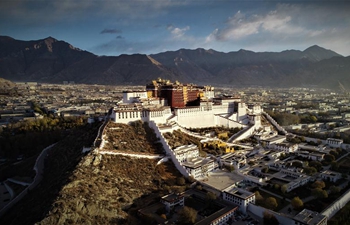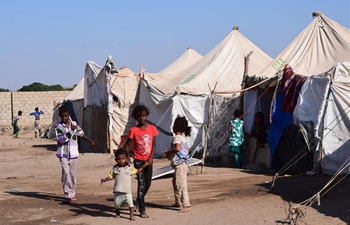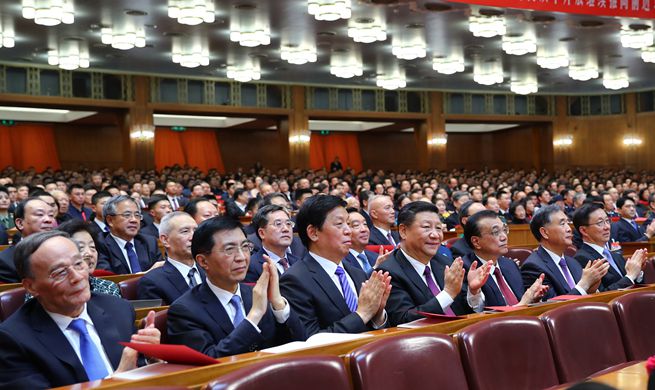ISTANBUL, Dec. 15 (Xinhua) -- As Turkey announces an imminent cross-border operation to eliminate the U.S.-backed Kurdish militia in Syria, analysts differ on whether the move would face opposition from Washington and lead to a clash with U.S. troops.
DIVERGENT VIEWS
"The possibility of a clash between Turkish and U.S. troops is nonexistent," Erdogan Karakus, a former general in the Turkish Air Force, told Xinhua.
Noting Washington's special envoy for Syria, James Jeffrey, was in Ankara last week, he said, "The U.S. appears to have given the green light to a limited operation."
Turkey sees the presence of the Kurdish militia, known as the People's Protection Units (YPG), along its border in northeastern Syria as an existential threat. Ankara has long stated its opposition to a "terror corridor" along its border and repeatedly urged Washington to stop arming the fighters.
The threat of a military operation was made most strongly on Wednesday by President Recep Tayyip Erdogan, as he spoke of an operation within a few days to kick the Kurdish militia from the eastern part of the Euphrates River.
The U.S., which has supported the YPG as a ground force against the Islamic State during the Syrian war, has several thousands of troops and around 20 bases in the Kurdish area.
"Clashing with the U.S. troops would be inevitable," argued Haldun Solmazturk, a former army general. He maintained that the U.S. would neither withdraw its troops nor remain silent even on a limited operation, as Washington is now bounded by its previous statements indicating opposition to a military operation against the YPG.
U.S. officials had stated that Washington would stand by its Kurdish ally in case of an attack.
Pentagon spokesman Sean Robertson said on the same day Erdogan talked about Ankara's plan that any military operation into Syria's northeast would be a grave concern for Washington, particularly because some U.S. personnel may come under fire, and that any "uncoordinated military operations" would harm shared interests.
In Karakus' view, the Pentagon discourse is to save appearances.
"It is natural that the Pentagon would like to show in its discourse that it will stand by the YPG," he said.
The U.S.-backed Syrian Democratic Forces (SDF), which are spearheaded by the YPG, vowed that it would fiercely fight against a Turkish intervention.
The SDF is estimated to have 60,000-70,000 fighters trained by the U.S.
President Erdogan had a phone call with his American counterpart Donald Trump on Friday evening, in which they reportedly agreed to have a more effective coordination regarding Syria.
The phone conversation came after Erdogan once again voiced Ankara's determination to eliminate the terror threat on the eastern side of the Euphrates if the U.S. would not do it.
The Turkish leader also warned that the Turkish military would drive the Kurdish militia from Manbij, a Syrian town on the western bank of the Euphrates, if the U.S. fails to do so.
In the view of Solmazturk, Erdogan's remarks signaling U.S. troops would not be targeted have no significance once the operation begins, as it would be impossible to predict how things progress on the ground thereafter.
Arguing Ankara's discourse may well be politically oriented, he stated, "The U.S. may take some symbolic steps -- sort of concessions without much value -- to strengthen Ankara's hand ahead of the upcoming local elections."
Turkey is scheduled to have local elections at the end of March next year.
OPERATION IMMINENT?
Turkish jets hit targets linked to the YPG in northern Iraq on Thursday evening.
Iraq's north, where the outlawed Kurdistan Workers' Party (PKK) has bases, serves as a corridor linking the PKK and the YPG.
Ankara says the YPG is the Syrian branch of the PKK, which has been fighting since 1984 for an autonomous, if not independent, Kurdistan in Turkey's predominantly Kurdish southeast.
The announcement of the operation several days in advance is Ankara's message for Washington to take measures to protect its troops from being harmed, said Murat Bilhan, a former diplomat.
The U.S. has built lately some observation posts on the Syrian side of the Turkish border, which it said would prevent the YPG from posing any threat to Turkey.
Bilhan does not think the U.S. would intervene to block a Turkish operation against the Kurdish militia.
"The U.S. would not wish to have Turkey as yet another hostile power against itself in Syria," observed Bilhan, who serves as the vice chairman of the Istanbul-based Turkish Asian Center for Strategic Studies.
Russia and Iran, supporters of the Syrian government, have insisted on U.S. forces leaving Syria, while Turkey has avoided criticizing U.S presence in Syria.
"The U.S. cannot afford to lose Turkey which is a regional ally with much strategic importance," said Karakus. "That's why it would not say no to an operation."
In contrast, Solmazturk, who heads the Incek debates at the Ankara-based 21st Century Turkey Institute, feels that the West would stand by the Kurdish militia rather than siding with Ankara, since the West plans to create a Kurdish state in the region.
Russia would not be pleased with Turkey's operation against the YPG either, Solmazturk said, arguing Moscow would not wish to lose the Kurds either.
It is widely estimated that Turkey's operation would primarily aim to disconnect the two YPG cantons along the border and prevent the militia from getting logistical support from northern Iraq.
Despite threats already made, Solmazturk does not think Ankara would launch an offensive against the YPG. He stated that it would be a totally adventurous move putting Turkey on a shaky ground as Ankara lacks a sound political target in Syria.
Other than Manbij, the Kurdish militia has established two self-declared autonomous cantons on the eastern part of the Euphrates during the war.
The Turkish military has launched two operations inside Syria since 2016, targeting the Islamic State and the Kurdish militia.

















